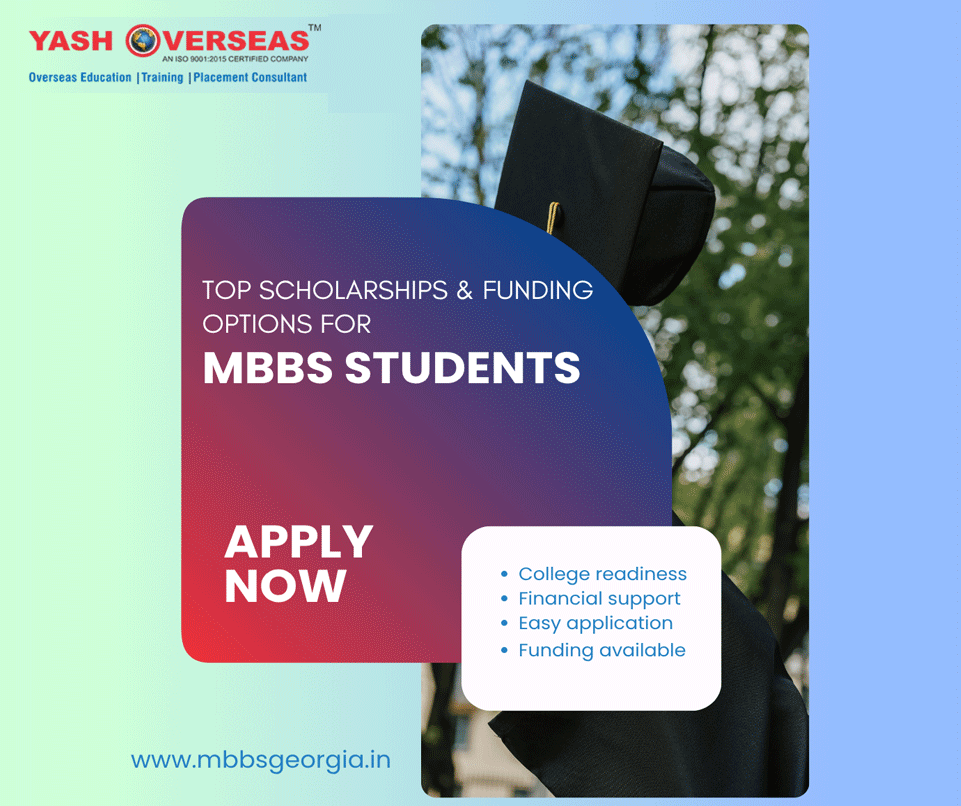By admin / 06 Nov 2025
Why Georgia is an attractive destination for MBBS
Before delving into scholarship options, it’s helpful to understand why Georgia is chosen by many MBBS aspirants:
- Universities in Georgia offer MBBS/MD programmes in English, making them accessible to international students.
- The tuition fees and cost of living tend to be more affordable compared with many Western countries and some private medical colleges in India.
- Many Georgian medical universities are recognised by global bodies, making the degree valid for further licensing (after required exams) in many countries.
- For Indian students specifically: rising interest. (For example, data show increasing remittance to Georgia for education from India.)
Georgia offers a viable, internationally-oriented medical education choice — and scholarships / financial aid make it even more accessible.
Types of Scholarships & Funding Options
When planning to study MBBS in Georgia you can consider three major categories of financial support:
University-Based Scholarships
These are offered by the medical universities in Georgia and typically apply to both domestic and international students. Some features:
- Merit-based scholarships: awarded to students with high academic performance (school leaving exams, entrance exams, or 12th grade marks).
- Need-based scholarships: for students demonstrating financial constraints.
- Performance-linked scholarships: awarded after enrolment based on ongoing semester results, sometimes with tuition reductions or waivers.
- Typical coverage: Some universities offer tuition fee waivers of 10-50% depending on criteria. Example: Top students may get 20-50% tuition fee discount.
Examples:
- Tbilisi State Medical University (TSMU) offers merit-based scholarships and partial tuition waivers to international students.
- University of Georgia (in Tbilisi) offers merit scholarships for international students – up to 50% tuition reduction in some cases.
- Batumi Shota Rustaveli State University (BSU) offers partial scholarships (up to ~40% fee waiver) for top-performing foreign students.
Application tips for university-based scholarships
- Always submit your high school/senior secondary mark sheet and certifications (e.g., NEET for Indian students) if relevant.
- Maintain good semester GPA once enrolled (many scholarships are renewable). Apply early and check specific university deadlines for scholarship consideration.
- Keep documentation ready: transcripts, proof of extra-curricular achievements (if required), personal statement or motivation letter.
Government & Country-based Scholarships
These include funding from either the Georgian government (or Georgian state-supported schemes) or from the student’s home country (e.g., India) for studying abroad.
The Georgian government does occasionally provide scholarships for international students to study in Georgia. Example: scholarships up to US$ 20,000 (for tuition + living) for international students in Georgia.
From the Indian side: schemes like the National Overseas Scholarship (by India’s Ministry of Social Justice & Empowerment) can support Indian students studying abroad, including in Georgia.
Similarly the JN Tata Endowment Loan Scholarship for the Higher Education of Indians offers loan-cum-scholarship support for Indian students going abroad.
Important considerations
- These government‐supported scholarships are usually competitive and have specific eligibility (income criteria, domicile, academic achievement, etc.).
- Scholarships that cover tuition and living cost are rare; often they cover only tuition or partial cost.
- For Indian students: keep in mind that you will still need to factor in living expenses + travel + incidental costs even with scholarship support.
Loan strategy
- Borrow only what you realistically need. Include cost of living, visa, travel, insurance.
- Understand repayment terms: usually repayment starts after course completion or after employment.
- Some loans may offer interest subsidies (for Indian students) or favourable terms if the destination is approved/universities are recognised.
Eligibility & Selection Criteria – What You Should Be Prepared For
When you apply for scholarships/funding for MBBS in Georgia, typically you’ll need to meet one or more of the following:
- A strong academic record (often > 70% or more in senior secondary or equivalent). Good performance in entrance exams (for Indian students this might be NEET) or equivalent eligibility.
- For continuing scholarships: maintaining good GPA throughout semesters.
- For need-based scholarships: proof of financial hardship, family income, etc.
- For specific scholarships: extra-curricular achievements (leadership, sports, community service) may help.
- English proficiency may be required if the course is in English.
- Meeting university admission criteria (MBBS eligibility: age, 12th grade with science, NEET qualifying in India, etc.).
Tips to Maximise Your Chances of Getting a Scholarship
- Excel academically: Top grades in 12th grade and high NEET (if applicable) help.
- Apply early: Some scholarships are limited in number and awarded on a first-come or competitive basis.
- Maintain performance: For ongoing scholarships, ensure you meet GPA or semester criteria.
- Demonstrate your profile: If you have any extra-curricular achievements, leadership experience, community service — highlight them.
- Communicate clearly: For need-based funding, prepare a well-written statement explaining your financial situation.
- Apply to multiple universities: Don’t rely on one university — check scholarship opportunities across several Georgian medical schools.
- Check fine print: Some scholarships may exclude certain costs (like hostel, meals, travel) so know exactly what is covered.
- Plan for living expenses: Even with tuition waiver you still need to budget for accommodation, food, travel, and personal costs.
- Stay updated: Scholarship criteria may change year to year; always check the latest on university or government sites.
